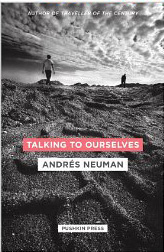Pushkin Press
 In his introduction to the Argentine-Spanish writer Andrés Neuman at the recent mini Fiction Fiesta in Cardiff University, his friend Richard Gwyn, tongue firmly in cheek, referred to his ‘revolting prodigiousness’.
In his introduction to the Argentine-Spanish writer Andrés Neuman at the recent mini Fiction Fiesta in Cardiff University, his friend Richard Gwyn, tongue firmly in cheek, referred to his ‘revolting prodigiousness’.
Revolting, most certainly not: Neuman is as delightful an interviewee as he is a writer, fair fizzing with ideas and engaging insights. Prodigious, yes, as Neuman’s already filled well nigh half a shelf with novels, short stories, essays and poetry collections. It’s even more of an achievement when one ponders the fact that he was born in 1977.
His most successful title to date is Traveller of the Century, a capacious, inventive and capaciously inventive work which belongs, in the words of Juan Gabriel Vasquez ‘in the quintessentially Latin American genre of the “total novel”: the all-encompassing narrative bent on exploring every theme, every social milieu, every emotional possibility.’ Following the artistic arc of Schubert’s Die Winterreise, and looking at European history from a South American perspective, the expansive novel matches ambition with ability and Neuman really pulls it off.
The follow up seems slight by comparison with the previous tome, weighing in at a little over 150 pages. Yet, despite the smaller scale and the fact of it’s written in a minor key Neuman manages to concertina an awful lot into the book. Written in a pellucid prose (faithfully rendered, courtesy of his by-now usual translators Nick Caistor and Lorenza Garcia) Talking to Ourselves has real intellectual heft not to mention a wide range of deep emotions.
On the face of it it’s the tale of one man’s illness and subsequent death told via three voices: Mario, a travel agent now on his final life’s journey; his bookish wife Elena and their gadget-obsessed son Lito, who thinks he can change the weather by acts of will. Their lives, their testimonies are delivered in the first person, and have vigour aplenty and authenticity in spades. If the book has a flaw it’s the way in which Elena’s story tends to overshadow the other two characters, yet her story is so strong and horribly compelling that one wants to know more.
Mario, now in the dying phase, takes his son on a road trip through a landscape which seemingly melds together elements and place names of many Spanish speaking countries, as manufactured as some of the stories in the book. The two leave Elena to deal with both absence and the echoes of her husband’s illness. She visits the doctor and starts a Last Tango in Paris style affair, brutal in its physicality and mutual degradations. It’s the moral fulcrum at the heart of the novel, and a sometimes repellently twisted one at that.
The three characters tell their stories using various modes of communication, from talking through writing to thought. We thus have talking aloud, thinking aloud and oral history and Elena’s account (by far the most engaging and enthralling) is bolstered by quotations she has underlined in the books she reads, quotations from John Banville to Lorrie Moore, from Richard Ford to the aforementioned Richard Gwyn, spliced intriguingly into the text with her commentaries interlaced. In this Talking to Ourselves is a meditation on reading, reminding me of that fine, fine French film La Lectrice. with its similarly engaging central character.
Throughout Neuman’s story of loss, sex, words and death, the interiority of each character’s life is convincingly offered, indeed, put on near clinical display to the reader. After Mario’s death Elena places a photograph of him in the living room:
I put you on one of the higher shelves, near the window, so that you can breathe or amuse yourself a little. Until recently I felt incapable of looking at photos of you. It was like moving my hand toward a sharp object. You gazed into my eyes so trustingly, so shamelessly alive. Those photos triggered in me a feeling of unreality in the opposite direction: what was impossible, dream–like, was outside the portrait. Not you on that side, grinning. Us, here, now. This half a house.
That’s a good example of how clear-eyed the writing can be in this compact, crisp and compelling book. Neuman, still in his thirties, is, undoubtedly a very, very serious talent. One feels invincibly convinced that following his future writing trajectory will be one heck of a journey, a venture into the furthest reaches of language itself.










